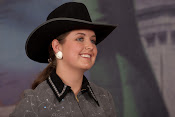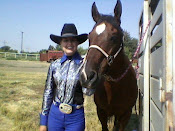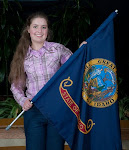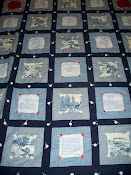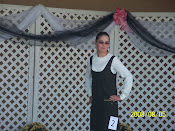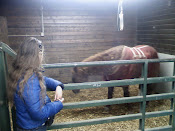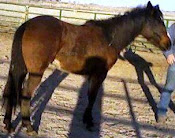 The meeting was called to order pledges were given and we were off to do the Hodge Podgers community service project; we picked up trash it was really hot. When we were done we all when back and had root beer floats and set in the shade. Logan gave her demonistation on parts of a horse, the meeting was ajourned and we all went home.
The meeting was called to order pledges were given and we were off to do the Hodge Podgers community service project; we picked up trash it was really hot. When we were done we all when back and had root beer floats and set in the shade. Logan gave her demonistation on parts of a horse, the meeting was ajourned and we all went home.We All Learn At a Different Pace
What did I learn about myself through my 4-H participation?
I learned that it is not easy to be 16 and on the edge of adulthood.
Head - to clear thinking, when giving your word to someone, think about how it will affect your heart if you buckle to peer pressure and go against your morals and ethics .
Heart - to greater loyalty; loyalty is something that is given freely and cannot be demanded or forced upon someone.
Hands - to larger service, you can only do what you feel is right and work hard to achieve your goals.
Health - to better living; if your word is your honor, and you stand fast to your morals and ethics; loyalty will come to you freely, your goals will be realized, and you will make a difference in the world around you.
I love 4-H !
Peer pressure is one of the hardest things we face; stay true to yourself no matter how hard it is and make a difference!
Farmer's Hands Video
Monday, May 18, 2009
Hodge Podgers May 17, 4-H Meeting
 The meeting was called to order pledges were given and we were off to do the Hodge Podgers community service project; we picked up trash it was really hot. When we were done we all when back and had root beer floats and set in the shade. Logan gave her demonistation on parts of a horse, the meeting was ajourned and we all went home.
The meeting was called to order pledges were given and we were off to do the Hodge Podgers community service project; we picked up trash it was really hot. When we were done we all when back and had root beer floats and set in the shade. Logan gave her demonistation on parts of a horse, the meeting was ajourned and we all went home.Leather Project 2009
Thursday, May 14, 2009
2009 Leader Forum











Seem that spring has make it to the
high desert; and all our time is out side because of the excitement of all the colors of this beautiful time of year.
The smell of blooming sage brush the sight of new born calves, baby lambs, and the blue sky what else can a person ask for .
Saturday the May 9th Dad and I spent the day at the 2009 District III leaders forum, this is where all the Districts 4-h leaders give a 45minutes learning forum.
Our day started very early; can't have fun until after all the farm chores are done. That is just life on the farm around here.
The Forum was help in Twin Falls about 60 miles that's not to bad, just an hour. Our first Forum was on Etiquette for today's Youth. It was all about which fork to use, how to set the table, when do you not answer your cell phone and make sure it is turned off. Just your all around chance to renew your manners and refresher course on etiquette, It was presented by Samantha Anderson; Samantha even covered the ever present what to do when you need to fart. Samantha did a great job.
The Next forum was Showmanship Etiquette- it covered the five points of showmanship. Not a lot new there just a little refresher before the showing season starts; but when there is animals there is a lot of excitement. This was no exception of course the Bull had to jump out of the ring and we had to spend an hour trying to get it caught with as little damage to the the fair grounds and with out it causing a problem with the rest of the animal forums. That bull was free and he was having a good time, he was just playing, he ran, jumped, and played catch me if you can. When the Owner's Dad showed up he just stopped and loaded into the trailer like it was just a fun outing. Bulls you just got to love them!
Dad and I also attend the Dynamite Demonstration, Cost comparison of commercial beef vs. registered beef, And the Beef Quality assurance. These were the get down to business forums, lots and lots was learned at these. A person has to keep up with the ever changing times in the Beef industry.
note from mom
Something great happened to Cora; She and her 2008 steer Clover are the new cover of the Youth Beef Quality Assurance Program manual for the Pacific Northwest.
We think it is a honor, and the coolest thing. Gee I guess I just had to do the Mother bragging thing, we are very proud of Cora. Here are a few links http://cru84.cahe.wsu.edu/cgi-bin/pubs/PNW0593.html
Cora learned a lot and had a great time.
If you have never been to this kind of thing you should try it.
Sunday, May 3, 2009
A Short 4-H Club History
At the same time, agricultural colleges and experiment stations were accumulating a body of scientific knowledge that would improve the farmer’s productivity and living standards. These professors began to consider the possibilities of indirectly reaching the farmers through teaching the farmer’s children improved agricultural methods.
The idea of starting 4-H clubs cannot be credited to one individual or institution. Instead, 4- H has resulted from many pioneer leaders. However, three people seem to have played a significant role in promoting this 4-H movement: W.B. Otwell, of Illinois, was an early (1900) sponsor of special farm work for youth. A.B. Graham introduced modern
4-H club organization and methods in Ohio in 1902. And in 1905 O.H. Benson, County
superintendent of schools in Wright County, Iowa worked out a plan of tying farm problems and record keeping in with school work.
The practice of having volunteers lead 4-H clubs was established at the beginning and continues today. Community members trusted these leaders to be good models for their children. Farm women and men, trained by county Extension agents, acted as volunteer leaders in the early clubs. Usually leaders assumed a mentoring role, rather than serving as an authoritarian figure.
Throughout history, camping held and important role in 4-H. Initially it was seen as a means of rewarding and encouraging junior leaders. Documentation dated 1907 tells of a camp for boys held that year in Missouri. Thereafter, several states began holding camps, with West Virginia leading the way in formalizing camping as a part of 4-H. By the1921, West Virginia had established a permanent campsite that is still used.
During World War II, the 4-H program again focused on raising Victory Gardens. 4-H member also grew essential war crops, raised neat animals, and canned millions of jars of fruit, vegetables, and meats. The 4-H slogan was “ Food for Freedom.”
Thus, 4-H members helped relieve the labor shortage, served as neighborhood leaders, and assisted in war related activities. It was estimated from 1943 until the end of the war, 4-H clubs produced enough food to feed a million men serving the American forces. At the end of the war, 4-H enrollment once again saw a large increase, reaching a total of 2.5 million. The performance, achievements and contributions of 4-H’ers during the war is quite possibly the proudest moment among many such moments in the history and development of the 4-H program.







